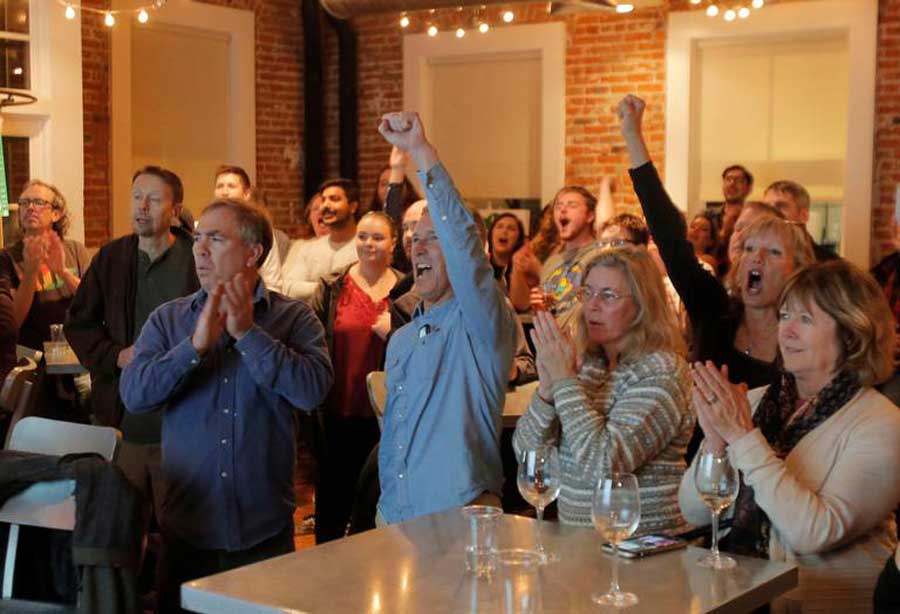Medicaid expansion passes in Idaho
Published at
BOISE (Idaho Statesman)– Idaho’s Proposition 2, Medicaid expansion, hit a groove early Tuesday night and just kept going. As of 7:30 a.m., the measure passed with the support of more than 60 percent of residents.
Expanding the state’s Medicaid program to cover childless and low-income adults had the support of Idaho Gov. Butch Otter and certain Republican state lawmakers, as well as industry stakeholders such as hospitals.
Excitement rippled through supporters gathered at an election watch party earlier in the evening.
Justine Parker, 27, a Republican from Boise, was in the Medicaid gap last summer before she was able to get on her partner’s health insurance. She said she has been fortunate to have health insurance for the most part, but knows a lot of people are more permanently in the gap.
“I don’t think somebody should have to stress day in and day out” about getting medical care, she said.
Jessica Rachels, 37, from Sandpoint, is a full-time caregiver to her daughter, who has a disability. Rachels was just diagnosed in June with bipolar disorder and has already spent hundreds of dollars on treatment. She said she hasn’t had health insurance in 12 years; her family has had to decide between paying their bills and keeping a roof over their head, or getting her health care.
Others in the room included people who volunteered for the Prop 2 campaign, hospital officials, lawmakers and other leaders in Idaho health care such as Dick Armstrong, former director of the Idaho Department of Health and Welfare.
Idaho’s Medicaid program is about as bare-bones as they come in the U.S. The health insurance is available to poor children and pregnant women, very low-income parents and people with disabilities.
Idaho lawmakers have declined for the past four years to expand the program so that it would cover tens of thousands of Idahoans who fall in the “Medicaid gap.” Mostly working poor, they aren’t eligible for Medicaid as it is now, but they don’t make enough money to qualify for health insurance subsidies, which are offered to people whose income is slightly above poverty level.
The ballot initiative was backed by stakeholders including Idaho’s hospitals. The hospitals provide millions of dollars of unreimbursed medical care to poor Idahoans who lack health insurance.
As the early results came in favoring expansion, Toni Lawson of the Idaho Hospital Association said, “It’s been a long time coming now.”
Medicaid was on the ballot in a few other states Tuesday night, but Idaho’s situation is unique, she noted. Idaho already has a tax-funded system to pay for catastrophic health care on behalf of poor Idahoans and could use that money instead to pay for Medicaid.
“The funding is there, we just need to allocate it in the appropriate manner,” she said.
Rural hospitals say Medicaid expansion would help them survive, as their peers around the country have been forced to close.
“Allowing the health care coverage gap to persist any longer is not an option,” Otter said in a news release Oct. 30 from the pro-expansion group Idahoans for Healthcare.
“We cannot continue to let hardworking Idahoans go without healthcare. I’m proud that the citizens of Idaho have come up with a solution to solve this long-standing problem,” he said. “I strongly support expanding healthcare to folks who need it. It’s good sense and it’s the right thing to do.”
The expansion effort is not without its critics. About 30 state lawmakers came out against the measure in the weeks before the vote. The Idaho Freedom Foundation has warned that estimates on how much it would cost Idaho to expand Medicaid may not be accurate. Other states have seen higher-than-expected enrollment, the conservative group argues.
And even if Proposition 2 passes, the Idaho Legislature still will need to approve the state’s share of the funding. Medicaid is a partly state-funded, mostly federally-funded program. The state would be required to pay for a smaller share of the cost than it spends on existing Medicaid benefits. From 2020 beyond, Idaho would be responsible for 10 percent of the cost.
Otter’s administration has looked for ways to get Idaho’s poorest adults signed up for medical insurance. This year, several top officials put forward a proposal known as the “dual waiver.” They wanted to move some of the most expensive patients off of the exchange — where they had insurance from private insurers like Blue Cross of Idaho — and onto Medicaid. At the same time, they would have offered people in the Medicaid gap the ability to move onto the exchange, where they would buy private insurance with federal subsidies.
The plan would have required a green light from federal regulators. But it never got that far, failing in the 2018 Legislature.
The story was originally published in the Idaho Statesman. It is used here with permission.



